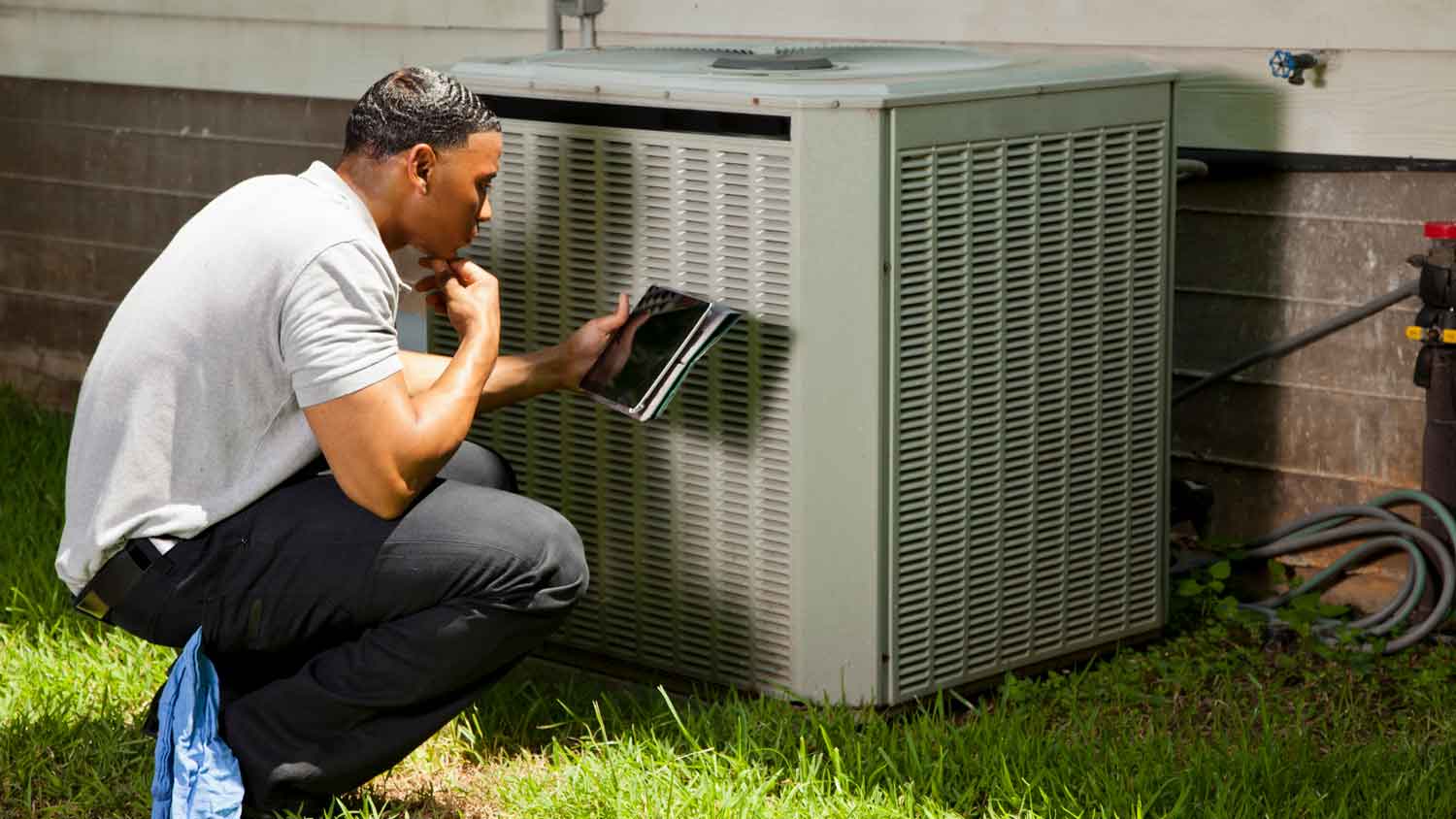
Springing for HVAC maintenance costs may seem like an extra—and easy-to-ignore—item on your checklist, but it will save you money in the long run.
A home warranty can bring you peace of mind if your HVAC system breaks down


Home warranties help offset the costs of replacing or repairing an HVAC system.
Some HVAC components might not be covered under your policy.
Plans typically include things like AC units, heating systems, and water heaters.
You may be able to upgrade your plan for additional coverage.
Before buying a new house, you probably take every precaution to make sure that everything is in good working order. But even the most rigorous inspection can’t predict when certain systems or appliances might wear out. That’s why it’s helpful to have a home warranty plan, which covers some repair or replacement costs. But does a home warranty cover HVAC? Yes, but there are some caveats. Let’s dig into the specifics of home warranty coverage, and learn when to consult your local HVAC company.
What’s included in your home warranty will vary depending on the company you buy it from and the level of coverage that you choose. However, most basic plans will protect:
Plumbing systems
Electrical systems
HVAC systems
Kitchen appliances, including ovens, refrigerators, and dishwashers
Home security systems
You can also sign up for advanced home warranty coverage, which can include things like:
Swimming pools, spas, and hot tubs
Sprinkler systems
Plumbing fixtures and exterior plumbing
Appliances outside of your kitchen, including additional refrigerators, stoves, and ovens
Electronics, such as TVs and speakers

So, does a home warranty cover HVAC repairs or replacements? The short answer: yes. Whether you pick a basic or advanced home warranty, it should include some level of HVAC protection.
However, that doesn’t necessarily mean that it will cover every component of your HVAC system. Typically, your warranty will provide discounts on repairs or replacements on things like central air conditioning, heating systems, and water heaters.
There are many types of HVAC systems, including split and hybrid systems. Before buying a home warranty, read the fine print to make sure that it includes coverage for the kind of HVAC system that you have. Certain HVAC components, like portable and window AC units, may not be protected.
When you buy a home warranty, you’ll pay a monthly or annual fee, which will protect your appliances and systems for a year after you sign up. On average, a home warranty premium costs between $220 and $1,800 per year, with most people paying about $1,050 for a year’s worth of coverage. On top of that, you’ll usually have to pay a service fee of $80 to $130 every time your warranty company sends a pro for repairs.
On the surface, home warranty plans might seem like a great way to protect yourself from pricey HVAC expenses. However, these policies aren’t always what they seem, and it’s important to understand what you’re signing up for.
Your warranty will only be valid in cases of normal wear and tear or age-related failures. In other words, if your HVAC system sustains damage from a storm and you have to call in the help of a local HVAC company, you can’t use your home warranty to help pay for the repairs or replacement.
Similarly, your warranty won’t cover issues that arise from poor maintenance on your part. In fact, not scheduling routine HVAC maintenance or trying to troubleshoot problems yourself can void your warranty.
By working on your HVAC system or undergoing important repairs on your own, you could void your unit’s warranty or further damage the system. Leave HVAC repairs to the pros.
When submitting a claim, your provider might ask for inspection reports or other proof that you’ve been maintaining your system. If you can’t provide it, they might not approve your request.
Normal wear and tear of HVAC system
Age-related failures of HVAC system
Routine inspections and maintenance
Damage to portable AC devices
Existing issues with HVAC system prior to purchasing home warranty
Damage caused by lack of maintenance and upkeep
Damage from a natural disaster, such as a fire or flood
Many warranty plans have limits on how much the insurer will pay to repair or replace the various parts of your HVAC system. For example, your policy may only include $1,500 worth of ductwork repairs, or there might be an annual cap on all of your claims.
Finally, your plan might protect certain parts of your heating and cooling system, but does home warranty cover HVAC replacement entirely? Not necessarily.
Your provider will generally be the one to choose whether repairing or replacing your system is best. If they believe that the damage is repairable, they’ll probably try that first. If that doesn’t work, they may approve you for a full replacement—but they might only offer a few models, which aren’t always top-of-the-line products.
From average costs to expert advice, get all the answers you need to get your job done.

Springing for HVAC maintenance costs may seem like an extra—and easy-to-ignore—item on your checklist, but it will save you money in the long run.

The average boiler installation cost depends on size, system type, and other factors. Keep reading to learn the cost of a new boiler.

Getting AC and furnace replacement done at the same time can lead to huge benefits for your wallet and your home. Here’s everything you need to know.

Baseboard heater covers can endure a lot of wear and tear, but eventually you’ll want to replace them. Here’s the best way to switch out baseboard heater covers.

A whole-house humidifier costs between $400 and $800, but can have an ROI of 40%. Learn if adding this HVAC appliance is worth it for you.

Learn about the different types of electric furnaces to decide why you would use one and which option is best for replacing your home heating system.